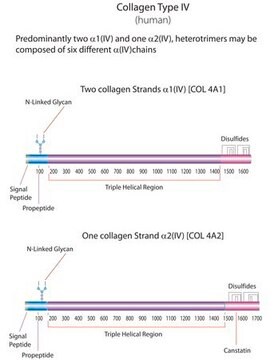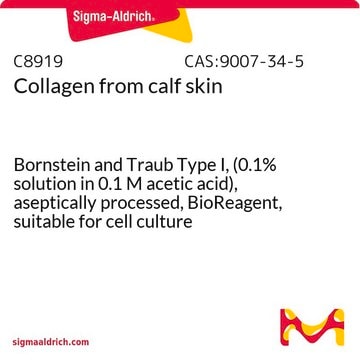C8374
Human Collagen Type IV
from human placenta, powder
Synonym(s):
Collagen from human placenta, Collagen Type 4
About This Item
Recommended Products
product name
Collagen from human placenta, Bornstein and Traub Type IV, powder
biological source
human placenta
Quality Level
Assay
>85% (SDS-PAGE)
form
powder
technique(s)
cell culture | stem cell: suitable
impurities
HIV, hepatitis B and hepatitis C, none detected
solubility
0.5 M acetic acid: 1 mg/mL, clear to very slightly hazy
storage temp.
−20°C
Gene Information
human ... COL4A1(1282) , COL4A2(1284) , COL4A3(1285) , COL4A4(1286) , COL4A5(1287) , COL4A6(1288)
Looking for similar products? Visit Product Comparison Guide
Application
Biochem/physiol Actions
Tissue injury in the autoimmune disease Goodpasture syndrome is due to pathogenic autoantibodies targeting the Collagen IV α3 chain . Mutations in COL4A5 are associated with Alport syndrome.
Components
Caution
Preparation Note
Analysis Note
Other Notes
Storage Class Code
11 - Combustible Solids
WGK
WGK 1
Flash Point(F)
Not applicable
Flash Point(C)
Not applicable
Certificates of Analysis (COA)
Search for Certificates of Analysis (COA) by entering the products Lot/Batch Number. Lot and Batch Numbers can be found on a product’s label following the words ‘Lot’ or ‘Batch’.
Already Own This Product?
Find documentation for the products that you have recently purchased in the Document Library.
Customers Also Viewed
Our team of scientists has experience in all areas of research including Life Science, Material Science, Chemical Synthesis, Chromatography, Analytical and many others.
Contact Technical Service










